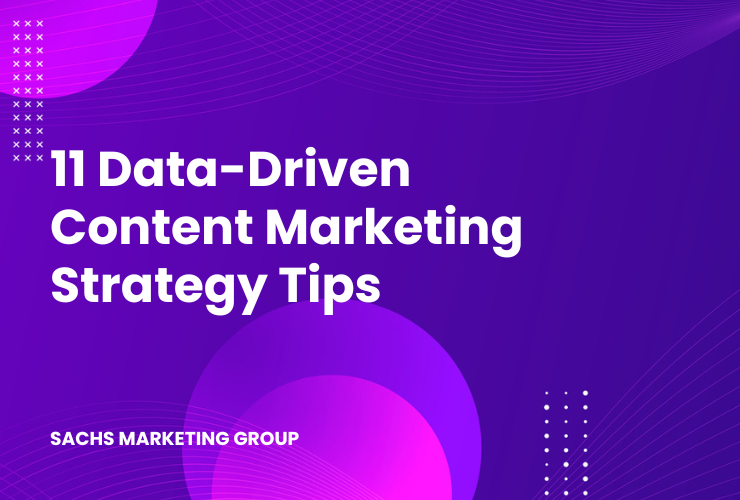A data-driven content marketing strategy refers to the process of utilizing quantitative and qualitative data to guide content creation, distribution, and evaluation. It helps in aligning content with audience needs, trends, and organizational goals, making marketing efforts more effective and measurable.

Small business owners often struggle to leverage the power of content marketing to cut through the noise of the bustling web and effectively reach their target customers with their messaging.
Without a precise strategy, content can miss the mark, failing to engage or convert the intended audience.
Leveraging data-driven content marketing, businesses can create purposeful, personalized, and powerful content that resonates with their audience, driving tangible results.
Overview
What is Content Marketing?
Content marketing involves the creation and sharing of online material, such as blogs, videos, social media posts, that does not explicitly promote a brand but stimulates interest in its products or services. It’s about providing valuable, relevant content to attract and engage a clearly defined audience.
When your potential customers discover your content and find it helpful, your reputation as a knowledgeable expert receives a boost. This is why content marketing is important for small businesses – it shines a positive light on your business, and, in turn, may lead to people reaching out to you when they need your services.
Data-Driven Content Marketing Strategy Tips
Data plays a pivotal role in shaping content strategies today. So, how you can integrate data-driven insights to craft compelling content that not only reaches your audience but also resonates with them?
Here are several data-driven content marketing strategy tips to help you get started:
1. Define Clear Objectives
Defining clear objectives is the starting point for any content marketing strategy. You must know what you want to achieve. Is it brand awareness, lead generation, or customer engagement?
Once you have identified the goals, make them specific and measurable. They should align with your overall business targets.
Having well-defined objectives will guide your content creation process. It ensures that every piece of content serves a purpose. This approach helps in tracking success and makes adjustments easy if something is not working. It’s all about having a clear direction for your content efforts.
2. Understand Your Audience
Understanding your audience is a key factor in crafting a content marketing strategy that resonates with your target readers.
Start by analyzing data about your current customers. What are their interests? Age group? Buying behavior?
Next, create customer personas. These are fictional representations of different segments of your audience. They help in tailoring content to specific needs and preferences.
Finally, monitor user engagement with your content. Which posts are they reading or sharing? This insight helps in refining content to align more closely with audience interests, enhancing engagement and conversion rates.
3. Analyze Competitor Content
Analyzing competitor content is an essential step in shaping your content strategy.
Start by identifying your main competitors. Look at the content they are producing. What topics do they cover? What’s their tone and style?
Next, consider how audiences engage with their content. Are they commenting and sharing?
Evaluate what they are doing well and where they may be lacking. Find gaps that your content can fill.
This analysis will not only help you understand what your competitors are doing but also inspire new ideas. It’s a key to positioning your content uniquely in the market.
4. Utilize SEO Data
Utilizing SEO data is vital in content marketing.
Firstly, it helps in understanding what your audience is searching for online. Knowing the right keywords and search terms can guide your content creation.
Secondly, SEO data assists in ranking your content higher on search engines. By optimizing your content with relevant keywords, you can appear more prominently in search results.
Lastly, monitoring SEO metrics helps you in refining your strategies. You can see what’s working and what needs improvement, and adapt your content accordingly. In essence, SEO data provides a roadmap to create content that your audience wants and needs.
5. Measure Content Performance
Measuring content performance is vital to understanding what works and what does not. You must track key metrics such as page views, time on page, and conversion rates.
By analyzing these metrics, you can identify trends and patterns. This helps you pinpoint what resonates with your audience.
In turn, these insights guide adjustments and refinements to your content strategy. Continual measurement and analysis lead to ongoing improvement, ensuring that your content stays aligned with both audience needs and business goals.
6. Personalize Content
Using data to personalize content is a powerful strategy. You can gather information about your audience’s preferences, behaviors, and interactions.
With this data in hand, create content that speaks directly to individual users. This might include tailored recommendations or unique offers.
Personalized content resonates more with the audience. It feels less like marketing and more like a conversation.
By connecting with your audience on a personal level, you increase engagement and loyalty. In turn, this leads to higher conversion rates and customer satisfaction.
7. Implement A/B Testing
A/B testing is a crucial component of a data-driven content marketing strategy. It involves creating two versions of a piece of content to see which performs better.
Version A vs Version B
Create two versions of a webpage, email, or ad. Change one variable at a time, like a headline or image.
Monitor Performance
Track how each version performs. Look at click-through rates, engagement, or conversions.
Make Informed Decisions
Use the data collected to choose the more effective version. Implement it to enhance your overall strategy.
A/B testing takes the guesswork out of content decisions. It allows for continuous improvement based on real insights.
8. Use Social Media Analytics
Using social media analytics in a data-driven content marketing strategy is a way to enhance your connection with your audience.
Start by tracking the performance of your social media posts. This includes likes, shares, comments, and other engagement metrics.
Next, analyze these insights to identify what content resonates with your followers. Understanding the patterns helps in crafting posts that your audience truly values.
Finally, apply these learnings for future content creation. By continuously monitoring social media analytics, you can refine your content strategy, ensuring that your social media platforms are effective tools for engaging your audience.
9. Leverage User-Generated Content
User-generated content (UGC) refers to content created by customers or fans. It can be a powerful addition to a data-driven content marketing strategy.
- Authenticity: UGC brings authenticity to your brand. Customers often trust peer reviews and content over branded messages.
- Engagement: Encouraging customers to share their experiences increases engagement. It builds a community around your brand.
- Insights: Analyzing UGC can provide valuable insights. It helps you understand what your customers love about your products or services.
- Cost-Effective: Utilizing user-generated content can be more budget-friendly. It leverages the creativity of your audience instead of relying solely on in-house production.
10. Adopt an Agile Approach
Adopting an agile approach in data-driven content marketing means staying flexible and responsive. It involves continuously evaluating data and adapting content strategies accordingly.
In the fast-paced world of digital marketing, trends and audience behaviors can change quickly. An agile approach allows you to pivot and adjust your content to align with these changes.
By keeping a close eye on performance metrics and being ready to make quick adjustments, you ensure that your content remains relevant and effective. This strategy enables you to keep up with the ever-changing landscape and makes your content marketing more resilient and successful.
11. Partner with a Digital Analytics Expert
Partnering with a digital marketing agency, like Sachs Marketing Group, can elevate your data-driven content marketing strategy. Experts possess deep knowledge of data interpretation and application. They can sift through complex data sets, extracting insights that may be overlooked.
A content marketing expert helps in aligning content strategies with business goals. They use sophisticated tools to analyze audience behavior, content performance, and market trends.
Collaborating with an expert ensures that your content is not just hitting the mark but also evolving with the dynamic digital landscape. This partnership translates into more targeted and effective content, maximizing your return on investment.
Why Data is Important in Content Marketing?
Data drives insights and action. It helps in understanding the audience, optimizing content, measuring success, and continuously improving. The integration of data into content marketing ensures alignment with business goals and audience needs, making each piece of content more strategic and impactful.
Need Help with Your Content Marketing Strategy?
Struggling to reach your target customers with your content strategy? Sachs Marketing Group is here to help!
We specialize in data-driven content marketing designed to shine a positive light on your brand, boost your reputation as a trusted expert in your field, and encourage people to reach out to you for help. We don’t rely on guesswork – we actually analyze the data from your target customers and develop a content marketing strategy that’s tailored to help your business.
Say goodbye to the guesswork and start using the valuable insight from your actual data to inform your content marketing strategy.
Contact us today at 818-889-3232 to make your content work harder for you.
Conclusion
Embracing a data-driven approach in your content marketing is no longer optional; it’s essential. By integrating these data-driven content marketing strategy tips, you align your content with measurable goals, audience insights, and continuous improvement, setting your business up for success in the digital age.
Partner with experts like Sachs Marketing Group, and turn your content into a powerful tool that drives results.
Contact us today to get the conversation started!











